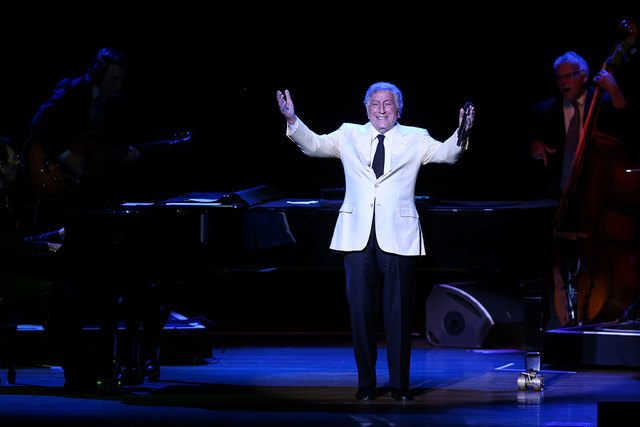Tony Bennett is not 90 years old.
Oh, sure, he was born nine decades ago as of Aug. 3.
But the man who sang from memory roughly two dozen songs — depending on how you count medleys — with hardly a pause Saturday night at the Ravinia Festival, in north suburban Chicago, looked and sounded like an artist just beginning the autumn of his years.
As for his energy level, rhythmic vigor, breath control, accuracy of pitch and soft-shoe dance steps: timeless.
In effect, two perspectives converged in this performance: the buoyancy of youth and the wisdom of the ages. No other vocalist in Bennett’s jazz/classic pop idiom ever has achieved such a feat to this degree, if only because none of his peers has lived so long or sung so well after so many decades in the spotlight.
No one admired Bennett’s art more than the king of the hill, Frank Sinatra, so it was thoroughly appropriate that the evening began with a brief recording of the Chairman of the Board proclaiming his admiration for Bennett’s work: “He’s the greatest singer in the world today, this man,” said Sinatra in the historic audio clip.
And he ought to know.
But no one, not even Sinatra, could have predicted that Bennett’s popularity would be at a zenith so late in the game (the Ravinia pavilion and lawn were packed), nor that Bennett would merit the acclaim. Music careers are fashioned as much by publicists and producers as anyone else these days, but Bennett’s art speaks eloquently for itself.
Granted, the marketing ingenuity behind Bennett’s career resurgence of the past couple of decades — orchestrated by son Danny Bennett — certainly hasn’t hurt. But it would have gone nowhere without the majesty of Bennett’s vocals, which has kept him far from nostalgia, despite the public’s ever-shifting musical tastes.
From the opening phrases of the night, in Michel Legrand’s “Watch What Happens,” Bennett made palpably clear why his art still sounds fresh. He held back certain rhythms just when you thought they were going to surge forward. He chose alternate melody notes that reshaped the contour of the tune. He stretched melody lines like elastic before allowing them to snap back into place.
If you had to crystallize this performance in a single word, there’s no question what it would be: surprise. That he also applied particular tone colors to each syllable, the better to express the lyric’s meaning, made this an object lesson in the art of song interpretation. And, yes, he can hold a note for a very long time when he feels it serves his dramatic purpose, as it surely did in the finale of “Watch What Happens.”
Over time, certain singers come to own certain songs by virtue of the insights of their readings, and “How Do You Keep the Music Playing?” probably will be Bennett’s property for quite a while. Legrand’s questing melody and Alan and Marilyn Bergman’s bittersweet lyric are all about the nuance, ambiguity and mystery of love and, of course, whether it can endure. Bennett’s extraordinarily slow tempo made this a vocal challenge, but by finessing it he turned an already profound song into something still deeper. The sheer plaintiveness of his timbre told the story, while his quasi-operatic flourishes somehow made an intimate soliloquy into something epic.
Bennett was more introspective yet in Duke Ellington’s “In My Solitude,” though here — and elsewhere in the evening — the singer had to contend with an overzealous audience member shouting out while Bennett was focusing on the music.
“Do that again — that guy was talking,” Bennett told pianist Mike Renzi, the singer unwilling to launch the song amid anything less than stillness.
So Renzi, the most elegant pianist Bennett has had since Ralph Sharon, began again, the quiet of Bennett’s delivery setting the stage for the anguished climax yet to come. The despair Bennett expressed via lines that very nearly cried out were worthy of Sinatra’s darkest ballads, a comparison one does not make lightly.
Of course there were up-tempo swingers too, Bennett riding his quartet’s lusty backbeats in “Sing You Sinners,” bringing a nimble bounce to “Steppin’ Out With My Baby” and thoroughly reconceiving a nocturnal tune that long has belonged to Sinatra, “One for My Baby (And One More for the Road).” Bennett’s exuberant recording of the song never has persuaded me, but in concert the brisk approach worked, the singer — with glass in hand — portraying a rejected suitor determined to transcend defeat.
In the end, though, it was the ballads that distinguished the performance. Bennett’s lyric poetry in “But Beautiful,” nearly whispered lines in “The Way You Look Tonight” and austere truth-telling in “Boulevard of Broken Dreams” making each a drama unto itself.
He managed to produce unexpected tonal shadings in the inevitable “I Left My Heart in San Francisco” and puckishly asked the audience to sing a large portion of “Chicago” while he listened and clapped along to the beat. Though Bennett fumbled a word or two, no one seemed to mind.
A sing-along “Happy Birthday” struck a festive note, but, really, the gifts were all ours.


